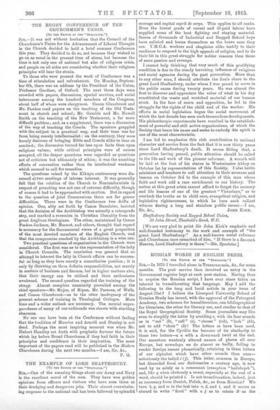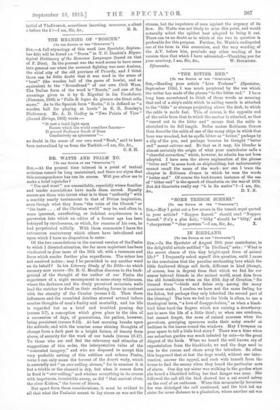RUSSIAN WORDS IN ENGLISH DRESS.
[To Title EDITOR, or MI " SPECTATOR."'
SIR,—In 1870 I travelled alone in Transcaucasia, &c., for some months. The post service then involved an entry in the Government register kept at each post station. Having thus to acquire the Russian script, I have ever since taken an interest in transliterating that language. May I add the following to the long and lucid article in your issue of August 21st P I believe the Liverpool University School of Russian Study has issued, with the approval of the Petrograd Academy, two schemes for transliteration, one bibliographical for librarians, the other for literary use, and similar to that of the Royal Geographical Society. Some journalists may like even to simplify the latter by avoiding c, with its four sounds as In "cat" (k), "cell" (a), " cheese " (tsh), "loch " (kh), not to add " choir " (le)! The letters al have been used, it is said, for the Cyrillic ha because of its similarity to those two letters—a u with a downward twirl at the end. Our ancestors wantonly altered names of places all over Europe, but nowadays we do almost as badly, failing to render foreign names phonetically, retaining in them letters of our alphabet which have other sounds than ours— notoriously the tailed i (j). This letter, common in Europe, but discarded from our dictionaries a century ago, is now used by us solely as a consonant (exception "hallelujah "), and, like y when obviously a vowel, especially at the end of a word, should be printed i. Is not transliteration, indeed, jest as necessary from Danish, Polish, &c., as from Russian? Wo turn b, g, and ra in the last into v, d, and I, and it seems as absurd to write " fiord" with a j as to retain 'B se the initial of Vladivostok, sometimes inserting, moreover, a silent



































 Previous page
Previous page